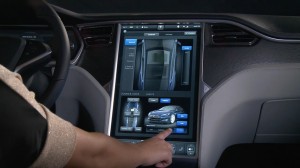
The recent challenge to computer hackers of $10,000 to the first who can break into Tesla's Model S controls has reignited concerns about cyber attacks on in-car computer systems.
With its digitally controlled battery-electric powertrain and a laptop computer-sized LCD screen operating everything from its climate control to its infotainment system, the Tesla Model S has more computing power than many homes or offices onboard – something that is making the sedan a tempting target for hackers.
In fact, those attending a high-tech conference in Beijing this week were offered a chance to nab a $10,000 bounty promised to the first to hack into a Model S. Whether they’ll succeed in remotely accessing the car’s 17-inch touchscreen display remains to be seen, but the growing reliance on technology in today’s cars is generating growing concerns about what that might mean if these systems are compromised.
That was the central theme at a news conference this week in the Detroit suburb of Troy, Michigan, that brought together some leaders in cyber auto security.
Hacking has been a major headache in the high-tech world, though until now it has largely targeted major computing networks – whether the Pentagon or Target’s customer database – and personal computers. But hackers are always looking for new opportunities, according to Karl Heimer, the director of the Battelle Center for Advanced Vehicle Environments, and one of the conference participants. That means more interest in smartphones and automobiles.

The issue of cyber auto security is discussed by (left to right), Rob Strassburger, of the Alliance of Automobile Manufacturers, Mike Camissa, of the Assoc. of Global Automakers, Battelle's Lisa McCauley, Delphi's Andrew Brown Jr., and Battelle's Karl Heimer.
While there was one well-publicized, government-backed instance in which a vehicle was hacked, there has been, so far, no documented instance in which hackers have actually broken into a motor vehicle’s computer system on their own, according to participants at the program.
But it appears to be only a matter of time, and there could be lots of places to cause trouble. The typical family car now has close to 100 million lines of computer code and in terms of complexity an automobile rivals a state-of-the-art F-35 fighter aircraft or the Boeing Dreamliner.
(“Retired” Ford CEO Alan Mulally resurfaces at Google. For more, Click Here.)
Lisa McCauley, vice president and general manager of Battelle Cyber Innovations, which has developed security systems for financial services sector and the government, said the auto industry has a lot of territory to defend now, and that is likely to grow as manufacturers adopt new technologies, especially the autonomous vehicle systems expected to begin to go into production by the end of the decade.
Making matters more of a concern is the rapid increase in connectivity, whether using Bluetooth or 4g LTE connections to the world outside the vehicle. By 2017, 60% of all new vehicles will be effectively connected to the internet, giving hackers new access to their technology, warned Andrew Brown Jr., vice president and chief technologist at Delphi Automotive.
(Click Here for details on Obama’s push for smarter roads in the U.S.)
“Connectivity is automatically a key issue,” he stressed, adding that Delphi takes the challenge very seriously and is developing more and broader cyber security expertise in-house to master future challenges, including developing protection for various vehicle subsystems.
The cyber security issue is enough of a challenge for several major global groups to pool their resources. The Alliance of Automobile Manufacturers and the Association of Global Automakers have agreed to set up an “information sharing and analysis center” for the automotive sector, said Mike Cammisa, director of Safety at the Association of Global Automakers.
(Battelle security expert thinks he’s come up with an entirely new way to keep hackers out of the driver’s seat. Click Here for the full story.)
Cooperation could be key, noted Battelle’s Heimer; however, suppliers and manufacturers have, until now, been reluctant to do so for fear of revealing their secrets and losing their competitive advantage. But with hackers looking for any opportunity available, the industry may have no choice but to mount a concerted counter-offensive.
(Paul A. Eisenstein contributed to this report.)

The criminals are light-years ahead of programmers and law enforcement thus it’s like the Wild West all over again but in the digital age. Absolutely nothing is secure contrary to what some folks believe or claim. Unfortunately it’s going to get much worse before it gets better as none of the current digitally connected world has properly addressed the liabilities before the hardware was released and now we will all suffer the consequences.